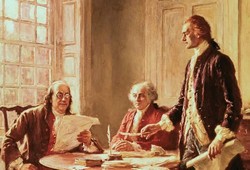Thomas Jefferson War
|
| updated |
Copy Link Code
|
 Despite the relevance of his preamble to the Declaration of Independence, the contributions of Thomas Jefferson during the Revolutionary War were probably the least among his accomplishments in the formation of the United States. After departing from the Second Continental Congress with independence officially declared, Jefferson returned to Virginia and was re-elected to the House of Delegates to represent Albemarle County. In 1779, Jefferson would be elected Governor of Virginia for a one-year term and re-elected again in 1780. Jefferson's service as Governor would be held in question after his evacuation of the capital at Richmond and delay in mustering the state militia. When a British force under the traitorous General Benedict Arnold captured the arsenal outside Richmond, Jefferson and members of the House fled to his plantation at Monticello. When they were pursued by dragoons, Jefferson took his family to another one of his plantations only miles to the west, Poplar Forest. Although Jefferson believed that his term as Governor was over at the start of the summer, members of the House were quick to condemn his lack of leadership in a time of crisis. Needless to say, Jefferson was not elected to a third year as Governor. In 1782, the wife of Thomas Jefferson, Martha Wayles Jefferson, died of complications related to the birth of their sixth child only months before. Distraught, Jefferson leaned on John Adams and his wife Abigail for support. His friendship with the Adams would last until he and John died on the same day, July 4, 1826.
Despite the relevance of his preamble to the Declaration of Independence, the contributions of Thomas Jefferson during the Revolutionary War were probably the least among his accomplishments in the formation of the United States. After departing from the Second Continental Congress with independence officially declared, Jefferson returned to Virginia and was re-elected to the House of Delegates to represent Albemarle County. In 1779, Jefferson would be elected Governor of Virginia for a one-year term and re-elected again in 1780. Jefferson's service as Governor would be held in question after his evacuation of the capital at Richmond and delay in mustering the state militia. When a British force under the traitorous General Benedict Arnold captured the arsenal outside Richmond, Jefferson and members of the House fled to his plantation at Monticello. When they were pursued by dragoons, Jefferson took his family to another one of his plantations only miles to the west, Poplar Forest. Although Jefferson believed that his term as Governor was over at the start of the summer, members of the House were quick to condemn his lack of leadership in a time of crisis. Needless to say, Jefferson was not elected to a third year as Governor. In 1782, the wife of Thomas Jefferson, Martha Wayles Jefferson, died of complications related to the birth of their sixth child only months before. Distraught, Jefferson leaned on John Adams and his wife Abigail for support. His friendship with the Adams would last until he and John died on the same day, July 4, 1826.
For an intellectual lawyer such as Thomas Jefferson, war was a distasteful means of instituting political change. While other men fought with muskets and bayonets, Jefferson went into battle carrying a pen. His words on the equality of all men and the inalienable right to freedom inspired generations of Americans to carry the torch of liberty. Even though the contributions of Thomas Jefferson in the Revolutionary War itself were relatively diminutive, his role as the author of the Declaration of Independence, the first Secretary of State and the third President of the United States gave him the chance to build a legacy in American mythology that could only be trumped by George Washington himself. In many ways, Jefferson's impact was greater than any other Founding Father as he was able to alter the role of government early in the nation's history and instill a form of democracy, although short-lived, that would be remembered by his name. Regardless of the underwhelming performance of Thomas Jefferson and the Revolutionary War years he spent as Governor, the criticisms he received would be heavily outweighed by the glowing accolades of folk history. Jefferson's genuine zeal for liberty, expressed so starkly in the Declaration of Independence, ensured the timelessness of his words. Indeed, the legacy of Thomas Jefferson transcends the reality of his contradictions. While he was on the one hand a bringer of liberty and democracy, he was on the other a major slave owner and believer in pseudo-scientific theories of racial superiority who felt that only white, male property owners deserved to vote.
